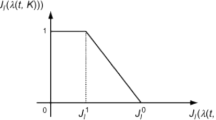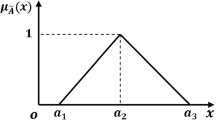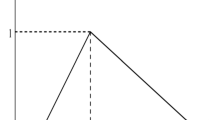Abstract
In this paper, we propose a solution approach to solving full fuzzy multiple objective linear fractional problems based on Zadeh’s extension principle. We adopt the idea of using triangular fuzzy numbers for the coefficients of the original problem and derive the shapes of the fuzzy variables with respect to the extension principle. The solution concept built in the novel approach strictly follows the basic arithmetic of fuzzy numbers, and the developed methodology contributes to correcting some inconsistencies in an existing approach from the recent literature. The solution we propose to the original problem is constructed out of the non-dominated points of crisp multiple objective linear fractional problems formed with feasible values of the fuzzy coefficients. The membership degree of each identified non-dominated point is computed with respect to the membership degrees of the coefficients involved. Our empirical results confirm and clearly illustrate the theoretical foundations


Similar content being viewed by others
Explore related subjects
Discover the latest articles, news and stories from top researchers in related subjects.Data availability
Enquiries about data availability should be directed to the authors.
References
Arya R, Singh P, Kumari S, Obaidat M (2020) An approach for solving fully fuzzy multi-objective linear fractional optimization problems. Soft Comput 24:9105–9119. https://doi.org/10.1007/s00500-019-04442-0
Bellman R, Zadeh L (1970) Decision-making in a fuzzy environment. Manag Sci 17(4):B-141-B-164
Chakraborty M, Gupta S (2002) Fuzzy mathematical programming for multi objective linear fractional programming problem. Fuzzy Sets Syst 125(3):335–342. https://doi.org/10.1016/S0165-0114(01)00060-4
Charnes A, Cooper W (1962) Programming with linear fractional functionals. Naval Res Logist Quart 9(3–4):181–186. https://doi.org/10.1002/nav.3800090303
Ebrahimnejad A, Verdegay J (2018) A new approach for solving fully intuitionistic fuzzy transportation problems. Fuzzy Optim Decis Mak 17:447–474
Feuring T, Buckley J, Hayashi Y (1998) Fully fuzzified linear programming: an evolutionary algorithm approach. In: 1998 IEEE international conference on fuzzy systems proceedings. IEEE World congress on computational intelligence (Cat. No.98CH36228), 1:611–616 https://doi.org/10.1109/FUZZY.1998.687558
Ghanbari R, Ghorbani-Moghadam K, De Baets B (2019) Fuzzy linear programming problems: models and solutions. Soft Comput. https://doi.org/10.1007/s00500-019-04519-w
Lamata M, Pelta D, Verdegay J (2018) Optimisation problems as decision problems: the case of fuzzy optimisation problems. Inform Sci 460–461:377–388. https://doi.org/10.1016/j.ins.2017.07.035
Liu ST (2015) Fractional transportation problem with fuzzy parameters. Soft Comput. https://doi.org/10.1007/s00500-015-1722-5
Liu ST, Kao C (2004) Solving fuzzy transportation problems based on extension principle. Eur J Op Res 153(3):661–674. https://doi.org/10.1016/S0377-2217(02)00731-2
Pérez-Cañedo B, Verdegay J, Concepción-Morales E, Rosete A (2020) Lexicographic methods for fuzzy linear programming. Mathematics 8(9):1540. https://doi.org/10.3390/math8091540
Pérez-Cañedo B, Verdegay J, Miranda Pérez R (2020) An epsilon-constraint method for fully fuzzy multiobjective linear programming. Int J Intell Syst 35(4):600–624. https://doi.org/10.1002/int.22219
Stanojević B, Dzitac S, Dzitac I (2020) Fuzzy numbers and fractional programming in making decisions. Int J Inform Technol Decis Mak 19(4):1123–1147. https://doi.org/10.1142/S0219622020300037
Stanojević B, Stancu-Minasian IM (2012) Evaluating fuzzy inequalities and solving fully fuzzified linear fractional program. Yugoslav J Op Res 22:41–50. https://doi.org/10.2298/YJOR110522001S
Stanojević B, Stanojević M (2014) Comment on Fuzzy mathematical programming for multi objective linear fractional programming problem. Fuzzy Sets Syst 246:156–159. https://doi.org/10.1016/j.fss.2014.02.007
Stanojević B, Stanojević M (2019) A computationally efficient algorithm to approximate the Pareto front of multi-objective linear fractional programming problem. RAIRO-Oper Res 53(4):1229–1244. https://doi.org/10.1051/ro/2018083
Stanojević B, Stanojević M (2021) Approximate membership function shapes of solutions to intuitionistic fuzzy transportation problems. Int J Comput Commun Control 16(1):4857
Stanojević B, Stanojević M (2021) Empirical versus analytical solutions to full fuzzy linear programming. In: Dzitac I, Dzitac S, Filip F, Kacprzyk J, Manolescu M, Oros H (eds) Intelligent methods in computing, communications and control, advances in intelligent systems and computing, vol 1243. Springer, Cham, pp 220–233
Valipour E, Yaghoobi M, Mashinchi M (2014) An iterative approach to solve multiobjective linear fractional programming problems. Appl Math Modell 38(1):38–49. https://doi.org/10.1016/j.apm.2013.05.046
Verdegay J (2015) Progress on fuzzy mathematical programming: a personal perspective. Fuzzy Sets Syst 281:219–226
Yang XP, Cao BY, Zhou XG (2015) Solving fully fuzzy linear programming problems with flexible constraints based on a new order relation. Inform Sci 29(4):1539–1550. https://doi.org/10.3233/IFS-151633
Zadeh L (1965) Fuzzy sets. Inform Control 8(3):338–353. https://doi.org/10.1016/S0019-9958(65)90241-X
Zadeh L (1975) The concept of a linguistic variable and its application to approximate reasoning i. Inform Sci 8(3):199–249. https://doi.org/10.1016/0020-0255(75)90036-5
Zimmermann HJ (1978) Fuzzy programming and linear programming with several objective functions. Fuzzy Sets Syst 1(1):45–55. https://doi.org/10.1016/0165-0114(78)90031-3
Zimmermann HJ (1985) Applications of fuzzy set theory to mathematical programming. Inform Sci 36(1):29–58. https://doi.org/10.1016/0020-0255(85)90025-8
Acknowledgements
This work was supported by the Serbian Ministry of Education, Science and Technological Development through Mathematical Institute of the Serbian Academy of Sciences and Arts.
Funding
The authors have not disclosed any funding.
Author information
Authors and Affiliations
Corresponding author
Ethics declarations
Conflict of interest
The author declares that she has no conflict of interest. Data sharing is not applicable to this article as no datasets were generated or analyzed during the current study.
Additional information
Publisher's Note
Springer Nature remains neutral with regard to jurisdictional claims in published maps and institutional affiliations.
Rights and permissions
About this article
Cite this article
Stanojević, B. Extension principle-based solution approach to full fuzzy multi-objective linear fractional programming. Soft Comput 26, 5275–5282 (2022). https://doi.org/10.1007/s00500-022-06884-5
Accepted:
Published:
Issue Date:
DOI: https://doi.org/10.1007/s00500-022-06884-5




